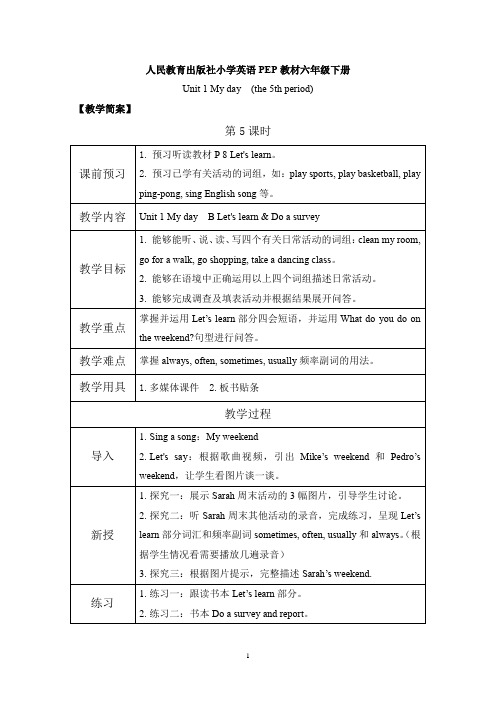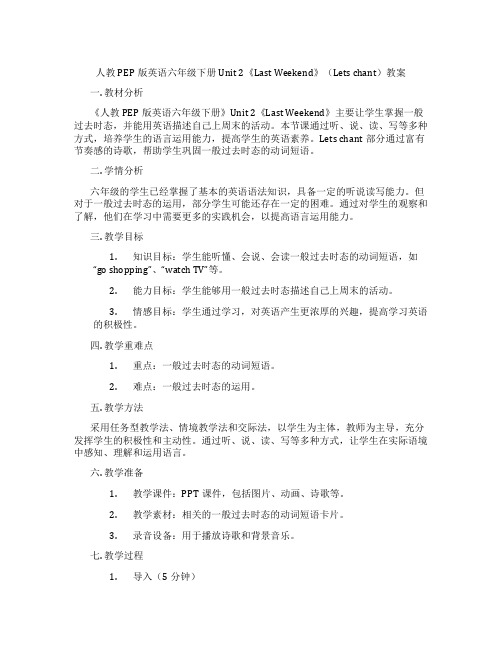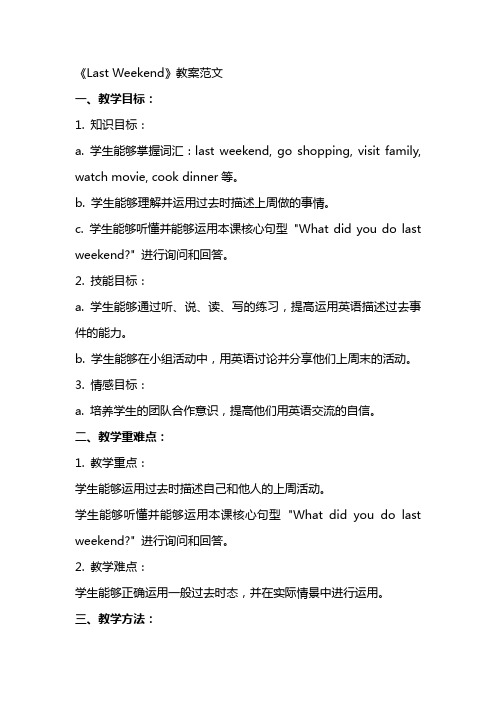Sarah'sweekend教案
小学英语PEP人教版三年级下册《Unit_3_last_weekend》教案9

小学英语PEP人教版三年级下册《Unit_3_last_weekend》教案9一. 教材分析《PEP人教版小学英语三年级下册》Unit 3 Last Weekend主要讲述了学生们在上个周末所做的事情。
通过本节课的学习,学生能够掌握一般过去时态,描述自己和他人在过去的时间所做的事情。
教材通过图片和对话的形式,让学生们在真实的情景中学习英语,提高他们的语言运用能力。
二. 学情分析三年级的学生已经掌握了基本的英语语音、词汇和简单的句子结构,具备了一定的英语听说能力。
但是,对于一般过去时态的掌握还不够熟练,需要在教学中进行针对性的练习和巩固。
此外,学生们在学习过程中,需要更多的实际操作和互动,以提高他们的学习兴趣和积极性。
三. 教学目标1.知识目标:–能够听懂、会说、会读关于一般过去时态的句子。
–能够用一般过去时态描述自己和他人在上个周末所做的事情。
2.能力目标:–能够通过图片和情景,理解一般过去时态的用法。
–能够在实际情景中,运用一般过去时态进行交流。
3.情感目标:–培养学生对英语学习的兴趣,增强自信心。
–培养学生与他人合作、交流的能力。
四. 教学重难点•一般过去时态的语法知识。
•描述过去时间所做的事情的句子结构。
•一般过去时态的运用,特别是在实际情景中的运用。
•准确理解和运用描述过去时间的句子结构。
五. 教学方法1.情境教学法:通过设置真实的情景,让学生在实际环境中学习英语,提高他们的语言运用能力。
2.交际教学法:引导学生参与课堂互动,培养他们的交流能力和团队合作精神。
3.任务型教学法:通过完成具体的任务,让学生在实践中学习英语,提高他们的学习兴趣和积极性。
六. 教学准备1.教材:PEP人教版小学英语三年级下册。
2.多媒体设备:电脑、投影仪、音响等。
3.教学图片:与本节课内容相关的图片。
4.教学卡片:含有本节课重点单词和句型的卡片。
5.教学录音:与本节课内容相关的一般过去时态的录音。
七. 教学过程1.导入(5分钟)利用多媒体展示一系列与本节课内容相关的图片,引导学生猜测图片中的人们在做什么。
人民教育出版社小学英语PEP教材六年级下册

人民教育出版社小学英语PEP教材六年级下册Unit 1 My day (the 5th period)【教学简案】第5课时【教学详案】课前预习:1.预习听读教材P 8 Let's learn。
2.预习已学有关活动的词组,如:play sports, play basketball, play ping-pong, sing English song等。
教学内容:Unit 1 My day B Let's learn & Do a survey教学目标:1. 能够能听、说、读、写四个有关日常活动的词组:clean my room, go for a walk, go shopping, take a dancing class。
2. 能够在语境中正确运用以上四个词组描述日常活动。
3. 能够完成调查及填表活动并根据结果展开问答。
教学重点:掌握并运用Let’s learn部分四会短语,并运用What do you do on the weekend?句型进行问答。
教学难点:掌握always, often, sometimes, usually频率副词的用法。
教学用具:1.多媒体课件 2. 板书贴条教学过程:一、Warming up1. Sing a song:My weekend2. Let’s say:根据歌曲视频,引出Mike’s weekend和Pedro’s weekend,让学生看图片谈一谈。
T: In the video, we sang about Pedro and Mike’s weekend. Look at this picture. If you are Mike, can you talk about his weekend?S: I often clean my room on the weekend. (板书often)S: I sometimes go shopping on the weekend. (板书sometimes)T: What about Pedro’s weekend?(指着Pedro的图片提问)S: I usually play football and play basketball on the weekend.(板书usually)T: Right. We can also say Pedro usually plays sports on the weekend.设计意图:歌曲活跃课堂气氛,营造轻松学习氛围,吸引学生的注意力,为学生学习课文词组和语言表达做铺垫;以歌曲中人物活动作为引子,帮助学生回顾所唱的内容,为后面学习相关周末活动做铺垫;其次,运用图片中的星级标注引出3个频率副词,将抽象内容具体化,有助于学生对虚词的理解。
小学英语PEP人教版三年级下册《Unit_3_last_weekend》教学设计7

小学英语PEP人教版三年级下册《Unit_3_last_weekend》教学设计7一. 教材分析PEP人教版三年级下册《Unit 3 last weekend》主要讲述了学生们在上个周末所做的事情。
通过学习本单元,学生们能够听、说、读、写关于过去时态的句子,并能够运用所学知识描述自己和他人的上一个周末的活动。
教材通过图片和情景对话的形式,让学生们在真实的情境中学习英语,提高他们的语言运用能力。
二. 学情分析三年级的学生已经具备了一定的英语基础,能够听懂简单的英语指令,并能用英语进行简单的自我介绍。
然而,他们在学习过程中仍然存在一些问题,如对过去时态的理解和运用,以及对英语语法知识的掌握。
因此,在教学过程中,需要注重对学生基础知识的巩固和语言运用能力的培养。
三. 教学目标1.知识目标:–学生能够听、说、读、写关于过去时态的句子。
–学生能够运用所学知识描述自己和他人的上一个周末的活动。
2.能力目标:–学生能够用英语进行简单的交流,提高他们的语言运用能力。
–学生能够通过图片和情景对话,提高他们的观察力和想象力。
3.情感目标:–学生能够对英语学习保持浓厚的兴趣,培养良好的学习习惯。
–学生能够在课堂上积极参与,提高他们的自信心和合作意识。
四. 教学重难点•学生能够听、说、读、写关于过去时态的句子。
•学生能够运用所学知识描述自己和他人的上一个周末的活动。
•学生对过去时态的理解和运用。
•学生对英语语法知识的掌握。
五. 教学方法1.情境教学法:通过图片和情景对话,让学生在真实的情境中学习英语,提高他们的语言运用能力。
2.交际法:引导学生进行小组合作,让他们在交流中学习,提高他们的沟通能力。
3.任务型教学法:通过完成任务,让学生在实践中掌握英语知识,提高他们的学习兴趣。
六. 教学准备1.教学课件:制作与本节课相关的课件,包括图片、视频、动画等,以便于引导学生进行学习。
2.教学素材:准备一些与本节课相关的图片和情景对话,以便于进行教学实践。
人教版七年级英语《Unit.9.How.was.your.weekend》教案

Unit 9 How was your weekend?Topic: Weekend activitiesFunctions: Talk about recent past eventsStructures:Simple past of regular and irregular verbsWhat questionsHow was your weekend? (formulaic)Target language:What did you do last weekend?On Saturday morning I cleaned my room.On Saturday evening I went to the movies.How was your weekend?It was great.Teaching StepsPeriod 1Good morning everyone! We have finished Unit 8. Today we are going to learn a new unit—Unit 9.Step 1: Lead inAsk and answera. Can you tell me what the title of Unit 9 is? Yes, it’s How was your weekend? What do you think the unit is about?b. Yes. In this unit we are going to talk about recent past events.Step 2: Section A 1aFirst, please open your books at Page 53 and look at activity 1a.1. Look and findLet’s look at activity 1a and find what the phrases mean.2. MatchYou know what the phrases mean. Please match them with the pictures.3. Check the answersHave you finished? Let’s check the answers one by one.Answers: 1. d 2. b 3. f 4. c 5. e 6. a4. Reada. Please read the phrases after me. Did my homework …b. Let’s read them together.c. Would you please read them one by one?Step 3: Section A 1b1. Listen and writea. Listen to the tape.b. Let’s write the day and “morning”, “afternoon” or “night” below each picture.2. Check the answersLet’s check the answers.Answers: Picture a: Saturday nightPicture b: Sunday afternoonPicture c: Saturday afternoonPicture d: Sunday nightPicture e: Saturday morningPicture f: Sunday morning3. Reada. I would like you to read the conversation together.b. Would you please read it by yourselves three times?c. This time I would like you to read it twice with your partner.d. Who would like to read in class?Step 4: Section A 1cPairwork1. ReadWould you please read the conversation in 1c with your partner?a. Imagine you are Lucy and your partner is Lucy’s friend. Would you please make conversations with your partner to talk about the activities in the picture?b. Who would like to have a try in class?Step 5: Section A 2a1. ListenNow class, let’s move to activity 2a now. Please listen to the tape for the first time2. UnderlinePlease underline the words you hear when you listen to it for the second time.3. Check the answersHave you finished? Please check your answers with your partner and see whether your answers are the same. Let’s check them together.Answers:Underlined items: grandmother, homework, math, beach, tennisStep 6: Section A 2b1. Listen and writea. Listen to the conversation for the first time.b. Please write “C” for Carol, “B” for Ben or “E” for Emma next to the statements in 2a.2. Check the answersHave you finished? Let’s check them.Answers: 1. E 2. E 3. B 4. C 5. C3. Reada. Let’s read the conversation together.b. I would like you to read it by yourselves.c. Who would like to have a try to read it in class?Step 7: Section A 2ca. Now class, let’s move to activity 2c. Would you please practice the conversation in 2c with the information in the box?b. Who would like to have a try in class?c. Well done. Please pay attention to the past forms of the verbs in the phrases.Step 8: Grammar Focus1. ReadRead the sentences in the grammar box.2. Point out the notesSimple past tense Regular verbs Irregular verbsStep 9: SummarizeLet’s summarize what we learnt in this period.Step 10: Homework1. Copy the words in activity 1a and the sentences in the grammar box.2. Read the tapescript of activity 2a and 2b.Period 2Step 1: Lead inWhat did we learn in Period 1? Who can tell us? Yes.We got to know how to talk about simple past tense. Besides them, we learnt some regular verbs and some irregular verbs. Do you still remember how to say them? OK. Let’s review them first.Step 2: Revision1. Ask and answera. Would you please write down the past forms of following words? 做作业、去海滩……b. Please practice in pairs. Student A says in Chinese and student B translates it into English.2. DictationPlease take out your dictation exercise books and let’s have a dictation.Step 3: Section A 3a1. Complete and numberToday, let’s move to a new part of Unit 9. Would you please look at acti vity 3a on Page 55? Complete the conversation and write numbers from 1 to 3 in the blanks.2. Check the answersI think all of you did well.Answers: 3, 2, 13. Reada. Read it with your partner. If you have any new words, please look them up in the word list or ask me for help.b. I would like you to read it together.c. Would you like to read it in class? Please have a try.4. ExplainHow was your weekend?studied forStep 4: Section A 3bPairworka. Just now, we learnt how to ask about the weekend. Now, I would like you to do a pairwork to ask and answer questions about Ming’s, Tony’s, and Sarah’s weekends from 3a.b. Who would like to have a try in class?Step 5: Section A 4Game—What did you do?Just now, we talked about Ming’s, Tony’s and Sarah’s weekends. How was your weekend? What did you do on your weekend? Let’s play a game guessing what you did. I would like to invite some students to draw pictures of two things you did last weekend. Others guess what you did.Step 6: SummarizeLet’s s ummarize what we learnt in this period.Step 7: HomeworkCopy and try to recite the conversations in 3a.Period 3Step 1: Lead inGood morning, boys and girls. Shall we continue our lessons? Could you please tell me what we learnt in Section A? Yes. We learnt to talk about the weekend.Step 2: RevisionReviewa. I will show you some pictures and please make conversations.b. Let’s have a dictation.Step 3: Section B 1a1. Looka. In Section A, we learnt some verbs and some verb phrases. In Section B, we are going to learn more.b. Open your books at Page 56. Would you please look at activity 1a?c. Look at the words and the pictures.2. MatchPlease match the words with the pictures.3. Check the answersHave you finished, everyone? Let’s check them together.Answers: 1. b 2. d 3. a 4. cStep 4: Section B 1bDrawa. Let’s move to activity 1b. Do you think the activities in 1a are fun or not fun? Draw a happy face or an unhappy face under each picture.b. Would you please tell your partner what you think about them?Step 5: Section B 2a1. Listen and completea. Let’s move to activity 2a now. It is a listening exercise. For the first time, I would like you to listen only.b. Now, for the second time, please listen to it again and complete the chart in activity 2a.2. Check the answersI think most of you have finished it. Let’s check them together.Answers: Sally: cleaned her roomdid her homeworkwent to the libraryJim: played soccerwent to a movievisited his friend3. Read the tapescripta. Let’s read the tapescript together.b. Would you please read the tapescript in pairs?c. Please translate the tapescript into Chinese in pairs.d. Who would like to read in class?Step 6: Section B 2bPairworkSuppose you are Sally and Jim. Would you please talk about your weekend with the information from 2a?Step 7: Section B 2cPair workTask—A surveya. Let’s perform a task now. Six students form a group. Everyone ask others what they did last weekend and fill in the chart.Example: A: What did you do last weekend?B: I did my homework.…b. Give us a short report to tell us what your friends did last weekend.Example: I interviewed some of my friends what they did last weekend. Mary did her homework …Step 8: SummarizeLet’s summarize what we learnt in this period.Step 9: HomeworkPractice activity 2a in Section B.Period 4Step 1: Lead inWe have finished the most part of Unit 9. And in this period, we will continue to finish Section B. But before that, I would like you to review what we learnt before.Step 2: Revision1. Make a speechCan you make a speech to tell us what you did and how your weekend was?2. DictationLet’s have a dictation.Step 3: Section B 3a1. Reada. Let’s go into activity 3a on Page 57. There is an article about kids’ weekend.b. Please read it by yourselves. If you have any questions, please ask me.c. I would like you to read it together.2. UnderlinePlease underline all the past tense verbs in the article.3. Check the answersI think most of you have finished. Please check your answers with your partner.4. ExplainLet me explain some key words and phrases to you.spend for on Saturday afternoon went to sw. watch a movie visit sb. play sportsStep 4: Section B 3b1. Look and fillThere is another article and some pictures. Would you please fill in the blanks according to the pictures given below?2. Check the answersI think most of you have finished it. Let’s check them. Would you please read your article to your friends and see whether your answers are the same.Answers: 1. cleaned my room 2. did my homework 3. visited my aunt4. went to the library5. played soccer6. watched TV3. Reada. Let’s read the article together.b. Please read it by yourselves this time.c. Who would like to have a try to read it in class?Step 5: Section B 3cTask—This was my last weekend.a. Let’s perform a task n ow. Just now, we read two articles in 3a and 3b. Please write your own last weekend. You may follow the examples in 3a and 3b.b. Please share your article about the weekend with your friends.c. I would like to invite some of you to read your article in class.Step 6: Section B 4Game—Who am I?Imagine you are a famous person. Write what you did last weekend. Then talk to your partner about your weekend activities. Your partner tries to guess who you are.Step 7: SummarizeLet’s summarize what we learnt in this period.Step 8: HomeworkTry to recite the article in 3a.Period 5Step 1: Lead inWe have spent four periods on Unit 9. This is the last period of Unit 9. In this period, we will do some exercises and make sure you learn this unit well.Step 2: Self-check-11. Check the words and the phrases you knowOpen your books and look at Self-check-1. If you know the words and the phrases well, please check them.2. ReadI would like all of you to read the words and the phrases together.Step 3: Self-check-21. Do you have any other words you don’t know? Please write them in your exercise books.2. Please ask your friends for help.3. Looking up the dictionary is also a good way to study English. I hope you can get more from dictionaries.Step 4: Self-check-31. Reada. Let’s move to Self-check-3 now. Please read the story about Old Henry by yourselves.b. Who would like to read it in class?2. Writea. Imagine you work for the Heartwarming Project. Would you please write a report about how you helped Old Henry last weekend?b. I would like you to share your report with your partner.c. Who would like to read your report in class?3. ExplainThere are some important phrases and words I would like to explain to you.enjoy go for a walk watch Wang Wang play play with it was time to do sth. look for want to do sth. not … anything Step 5: SummarizeLet’s summarize what we learnt in this period.Step 6: Homework1. Do the exercises on the Studen ts’ Book and the textbook.2. Review Unit 9.3. Watch the pictures in Just for fun on Page 58.人教版七年级英语《Unit 9 How was your weekend?》教案一、教学目标知识目标:学生能够掌握并正确使用一般过去时态的动词形式,包括规则动词和不规则动词的过去式,能够描述过去的活动和事件。
人教PEP版英语六年级下册Unit 2《Last Weekend》(Lets chant)教案

人教PEP版英语六年级下册Unit 2《Last Weekend》(Lets chant)教案一. 教材分析《人教PEP版英语六年级下册》Unit 2《Last Weekend》主要让学生掌握一般过去时态,并能用英语描述自己上周末的活动。
本节课通过听、说、读、写等多种方式,培养学生的语言运用能力,提高学生的英语素养。
Lets chant部分通过富有节奏感的诗歌,帮助学生巩固一般过去时态的动词短语。
二. 学情分析六年级的学生已经掌握了基本的英语语法知识,具备一定的听说读写能力。
但对于一般过去时态的运用,部分学生可能还存在一定的困难。
通过对学生的观察和了解,他们在学习中需要更多的实践机会,以提高语言运用能力。
三. 教学目标1.知识目标:学生能听懂、会说、会读一般过去时态的动词短语,如“go shopping”、“watch TV”等。
2.能力目标:学生能够用一般过去时态描述自己上周末的活动。
3.情感目标:学生通过学习,对英语产生更浓厚的兴趣,提高学习英语的积极性。
四. 教学重难点1.重点:一般过去时态的动词短语。
2.难点:一般过去时态的运用。
五. 教学方法采用任务型教学法、情境教学法和交际法,以学生为主体,教师为主导,充分发挥学生的积极性和主动性。
通过听、说、读、写等多种方式,让学生在实际语境中感知、理解和运用语言。
六. 教学准备1.教学课件:PPT课件,包括图片、动画、诗歌等。
2.教学素材:相关的一般过去时态的动词短语卡片。
3.录音设备:用于播放诗歌和背景音乐。
七. 教学过程1.导入(5分钟)利用图片和动画,引导学生回忆一般过去时态的动词短语,如“go shopping”、“watch TV”等。
然后播放诗歌“Last Weekend”,让学生初步感知一般过去时态。
2.呈现(5分钟)展示PPT课件,呈现诗歌“Last Weekend”的全文,让学生跟读诗歌,注意语音语调。
教师逐句讲解诗歌中的动词短语,如“go shopping”、“watch TV”等,引导学生理解一般过去时态。
《LastWeekend》教案范文

《Last Weekend》教案范文一、教学目标:1. 知识目标:a. 学生能够掌握词汇:last weekend, go shopping, visit family, watch movie, cook dinner等。
b. 学生能够理解并运用过去时描述上周做的事情。
c. 学生能够听懂并能够运用本课核心句型"What did you do last weekend?" 进行询问和回答。
2. 技能目标:a. 学生能够通过听、说、读、写的练习,提高运用英语描述过去事件的能力。
b. 学生能够在小组活动中,用英语讨论并分享他们上周末的活动。
3. 情感目标:a. 培养学生的团队合作意识,提高他们用英语交流的自信。
二、教学重难点:1. 教学重点:学生能够运用过去时描述自己和他人的上周活动。
学生能够听懂并能够运用本课核心句型"What did you do last weekend?" 进行询问和回答。
2. 教学难点:学生能够正确运用一般过去时态,并在实际情景中进行运用。
三、教学方法:1. 采用任务型教学法,让学生在实践中学习,提高运用英语的能力。
2. 采用情境教学法,创设生活情境,让学生在真实的环境中学习英语。
3. 采用分组合作学习,培养学生的团队合作意识。
四、教学过程:1. 热身(5分钟):教师与学生进行简单的英语对话,询问学生上周做了什么,引导学生用英语进行回答。
2. 引入(10分钟):教师通过图片或实物展示,引入本课的主题"Last Weekend",引导学生思考并回答"What did you do last weekend?" 的问题。
3. 新课呈现(15分钟):教师通过幻灯片或板书,呈现本课的核心词汇和句型,如"go shopping", "visit family", "watch movie", "cook dinner" 等,并进行讲解和示范。
Last weekend教案公开课
Last weekend教案公开课第一章:课程简介1.1 教学目标让学生掌握过去时态的构成和用法。
培养学生描述过去事件的能力。
提高学生听说读写四项基本语言技能。
1.2 教学内容过去时态的构成:主语+ 动词过去式+ 其他。
常用过去时态动词列表。
描述过去事件的句型结构:last weekend, I did something interesting. 第二章:热身活动2.1 活动目的激发学生对过去事件的兴趣。
缓解课堂紧张气氛。
2.2 活动内容让学生自由谈论他们上周末的活动。
引导学生用简单的句子描述过去的事件。
第三章:语法讲解3.1 教学目标让学生掌握过去时态的构成。
让学生能够自觉地运用过去时态描述过去事件。
3.2 教学内容过去时态的构成:主语+ 动词过去式+ 其他。
举例说明常用过去时态动词的用法。
第四章:实践练习4.1 教学目标提高学生运用过去时态描述过去事件的能力。
培养学生听说读写四项基本语言技能。
4.2 教学内容分组进行角色扮演,模拟描述上周末的活动。
学生互相练习听力和口语表达能力。
第五章:课堂总结5.1 教学目标让学生回顾本节课所学内容。
激发学生继续学习英语的兴趣。
5.2 教学内容教师总结本节课所学知识点。
学生分享学习心得和感悟。
第六章:互动游戏6.1 活动目的巩固学生对过去时态的掌握。
提高学生的团队合作能力。
6.2 活动内容组织一个“时间线”游戏,让学生按照时间顺序排列过去的事件。
学生分组进行,每组选择一位代表进行回答。
第七章:听力练习7.1 教学目标提高学生的听力理解能力。
让学生能够听懂并正确运用过去时态。
7.2 教学内容播放一段关于过去事件的听力材料。
学生听后回答相关问题,检验对过去时态的理解。
第八章:阅读理解8.1 教学目标提高学生的阅读理解能力。
让学生能够从阅读材料中获取信息并运用过去时态。
8.2 教学内容分配一篇关于过去事件的阅读材料。
学生阅读后回答相关问题,检验对过去时态的理解。
小学英语PEP人教版三年级下册《Unit_3_last_weekend》教案2
小学英语PEP人教版三年级下册《Unit_3_last_weekend》教案2一. 教材分析《PEP人教版小学英语三年级下册》Unit 3 “Last Weekend” 主要围绕学生们上个周末的活动展开。
通过学习本单元,学生将能够掌握一般过去时的表达方式,描述自己和他人的过去活动。
本单元的语言点包括一般过去时的动词形式变化,以及相关的时间状语。
二. 学情分析三年级的学生已经掌握了基本的英语语音、词汇和简单的句子结构,具备一定的听、说、读、写能力。
但对于一般过去时的表达和时间状语的运用还不够熟练。
因此,在教学过程中,需要结合学生的实际情况,逐步引导他们理解和运用本课的语言点。
三. 教学目标1.知识目标:学生能够听懂、会说、会读本课的生词和句子,掌握一般过去时的表达方式,运用时间状语描述过去的活动。
2.能力目标:学生能够在实际情境中运用所学语言进行交流,提高英语表达能力。
3.情感目标:培养学生热爱生活,积极向上的心态。
四. 教学重难点1.重点:学生能够听懂、会说、会读本课的生词和句子,掌握一般过去时的表达方式。
2.难点:时间状语的运用,以及一般过去时动词形式的变化。
五. 教学方法采用情境教学法、交际法、任务型教学法等,通过图片、视频、游戏等多种形式,激发学生的学习兴趣,提高他们的参与度和积极性。
六. 教学准备1.教学课件:包括图片、视频、动画等。
2.教学道具:与本课主题相关的小物件。
3.练习题:用于课后巩固所学内容。
七. 教学过程1.导入(5分钟)通过展示一张上周六的图片,引导学生谈论自己上周六的活动,为新课的学习营造一个轻松愉快的氛围。
2.呈现(10分钟)展示本课的生词和句子,让学生初步感知一般过去时的表达方式。
通过图片和实物,引导学生理解和记忆生词。
3.操练(10分钟)采用分组练习、角色扮演等形式,让学生在实际情境中运用所学语言进行交流,提高他们的口语表达能力。
4.巩固(10分钟)通过完成练习题,检查学生对生词和句子的掌握情况,巩固所学知识。
小学英语PEP人教版三年级下册《Unit_3_last_weekend》教学设计5
小学英语PEP人教版三年级下册《Unit_3_last_weekend》教学设计5一. 教材分析《PEP人教版小学英语三年级下册Unit 3 Last weekend》主要讲述了学生们在上个周末所做的事情。
教材通过图片和对话的形式,让学生们学会询问别人上个周末做了什么,并能用简单的句子进行回答。
本节课的主要词汇有play, visit, go, see, park, zoo等,主要句型为“What did you do last weekend? I played/visited…”二. 学情分析三年级的学生已经掌握了基本的英语发音和一些常用的单词,但对过去式的运用还不够熟练。
因此,在教学过程中,需要引导学生正确使用过去式。
此外,学生们对于描述自己和他人的活动还有一定的困难,因此需要通过大量的练习来提高他们的表达能力。
三. 教学目标1.能听懂、会说、会读本课的生词和句型。
2.能用英语简单描述自己和他人在上个周末的活动。
3.能正确运用过去式,并在适当的情境中进行运用。
四. 教学重难点1.重点:掌握本课的生词和句型,能用英语描述自己和他人的活动。
2.难点:正确运用过去式,并在适当的情境中进行运用。
五. 教学方法1.任务型教学法:通过设置各种任务,让学生在完成任务的过程中学习和运用英语。
2.情境教学法:创设真实的情境,让学生在实际情境中学习和运用英语。
3.游戏教学法:通过趣味性的游戏,激发学生的学习兴趣,提高他们的学习积极性。
六. 教学准备1.教学PPT:包括本课的单词、句型、图片等。
2.教学卡片:用于游戏环节。
3.教学录音:用于听力练习。
七. 教学过程1.导入(5分钟)利用图片和歌曲,引导学生谈论上个周末的活动,为新课的学习营造一个轻松愉快的氛围。
2.呈现(10分钟)通过出示图片,引导学生说出本课的生词,并板书单词。
然后,呈现句型“What did you do last weekend? I played/visited…”,引导学生进行回答。
小学英语PEP人教版三年级下册《Unit_3_last_weekend》教案3
小学英语PEP人教版三年级下册《Unit_3_last_weekend》教案3一. 教材分析《Unit_3_last_weekend》是小学英语PEP人教版三年级下册的一篇课文,主要讲述了学生们上一个周末的活动。
本课的内容与学生的生活紧密相连,易于引起学生的兴趣。
教材通过图片和对话的形式,让学生们学会询问和描述别人的周末活动,同时也复习了过去时态。
二. 学情分析三年级的学生已经掌握了一些基本的英语词汇和句型,对于学习新的英语知识有一定的接受能力。
但是他们仍然需要大量的听、说、读、写的实践来提高他们的语言技能。
此外,学生们对于描述自己和他人的活动还比较陌生,需要通过教师的引导和激励来提高他们的表达能力和交际能力。
三. 教学目标1.能够正确听说、读写单词和短语:last weekend, play chess, watch TV,go swimming, visit grandma, go shopping, homework。
2.能够正确运用一般过去时态描述自己和别人的上一个周末的活动。
3.能够通过本课的学习,提高自己的听说能力和交际能力。
四. 教学重难点1.单词和短语的学习和运用。
2.一般过去时态的运用。
3.如何引导学生用英语描述自己和他人的活动。
五. 教学方法采用情境教学法、交际教学法和任务型教学法。
通过设定情境,让学生在真实的语境中学习和运用英语。
通过交际活动,提高学生的表达能力和交际能力。
通过任务型活动,让学生在完成任务的过程中学习和运用英语。
六. 教学准备1.教材和教学参考书。
2.与本课相关的图片和视频。
3.教学道具和教具。
4.录音机和音响设备。
七. 教学过程1.导入(5分钟)通过提问学生们的上一个周末的活动,引导学生思考和回忆,激发他们的学习兴趣。
2.呈现(10分钟)展示与本课相关的图片和视频,让学生们直观地了解本课的内容。
同时,引导学生用英语描述图片中的人物和活动。
3.操练(10分钟)通过小组活动,让学生们互相询问和描述上一个周末的活动。
- 1、下载文档前请自行甄别文档内容的完整性,平台不提供额外的编辑、内容补充、找答案等附加服务。
- 2、"仅部分预览"的文档,不可在线预览部分如存在完整性等问题,可反馈申请退款(可完整预览的文档不适用该条件!)。
- 3、如文档侵犯您的权益,请联系客服反馈,我们会尽快为您处理(人工客服工作时间:9:00-18:30)。
【learning objects】
1.复习巩固What do you do on the weekend?句型。
2.复习相关一天中的活动及活动时间的短语和句子。
3.合理安排自己的学习和休息娱乐时间。
【Important&difficult points】
1.What do you do on the weekend?的问与答。
2.When do you ...?询问关于别人做某事的时间与回答。
【Preparation】
相关课件、活动图片等。
【Teaching steps】
Step 1:Warm-up
1.全班一起唱第一单元的歌曲“weekend”。
2.教师出示一些图片,学生说出这些活动。
Step 2:Presentation and practice
(1)借助图片,教师与学生实行问答练习,如:When do you get up? I always/often/sometimes get up at 6:30 in the morning.What do you do on the weekend? I always/often/sometimes go shopping. 等。
(2) 教师放第32页第一部分的录音,学生静听一遍,听第二遍时填写人名。
找几个学生说出他们的答案。
全班核对。
(3)学生模仿Oliver和Wu yifan打电话询问对方的活动,同桌实行练习,然后找学生到前面表演。
(4)教师展示Sarah的家,Sarah的爸爸正在和Robin交谈,教师介绍背景:It is Sunday morning. Sarah’s father is at home after
work.Sarah is still asleep,but Robin is up.Read and complete the dialogue.让学生自己完成填空。
然后集体订正答案。
Step3:Sum-up
协助学生总结本课的重点词汇和句子。
【Homework】
1.仿照课本33页,制作父母的时间表。
2.写一篇题为“My day”的短文。
【板书设计】
Recycle 1 Sarah’s weekend
When do you ...? What do you do on the weekend?
I always/often/sometimes...at... I always/often/sometimes...
eat breakfast go swimming
do morning exercises take a dancing class
have English class clean my room
go to bed play ping-pong。
